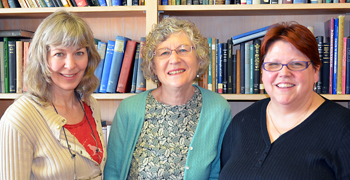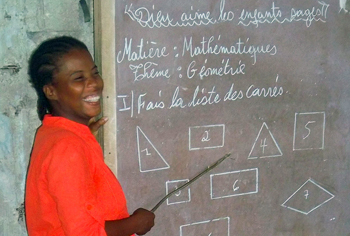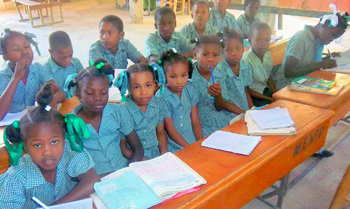Long-term commitment and giving from abundance aid development and support of a school in Cazale, Haiti
Giving from a sense of abundance and from a long-term commitment, supporters from five congregations in the Episcopal Diocese of Spokane are helping educate children in a Haitian village so they can rise out of poverty and help their community.
 |
| Robin Leiserson, Trish Newton, and Tracey Waring |
Their goal is to add one grade level and one teacher each year to St. André’s Episcopal School, so that children can graduate from high school in their community. To support more teachers, purchase school supplies and increase classroom space requires involving more congregations in the Diocese of Spokane.
The Haiti Project benefits more than Haitian children. Church members here are also finding benefits for their faith and lives.
Trish Newton, who visited Cazale, Haiti, in the mountains 30 miles northeast of Port-au-Prince, in May 2009 with the Very Rev. Bill Ellis of the Cathedral of St. John the Evangelist, knows the need first hand. She saw tears in the eyes of parents she met when they learned the crumbling school building would be renovated so their children could go to school to learn from trained teachers and have access to books, pencils, paper and other school supplies.
 |
| Haitian teacher |
Now nine teachers teach 170 students in preschool through sixth grade, “with plans for students to complete 12th grade with skills that give them a chance to find employment, stay healthy, help others and worship God,” Trish said.
With funding from supporters throughout the Episcopal Diocese of Spokane, the Cazale church’s vestry has repaired and expanded classrooms, paid the teachers on a regular schedule and provided three meals of rice and beans each week.
“New life also happens in the school’s supporting friends here in Washington,” Trish said. “It’s exciting to receive news and photos. We are encouraged and thankful to see how God multiplies our gifts so the students can flourish.
“We’re astounded when financial gifts arrive by mail from people who heard about the school and want to be part of the work there,” she said. “We learn about patience. Our prayer life deepens and we find we have more faith that seemingly impossible things will happen. We also have more gratitude for what we have.”
St. John’s outreach committee wanted to involve the congregation in a global project, aware that connecting with other cultures can change people’s ideas about God’s world and what God wants people to do.
Trish knows the difference it made in her life to help build classrooms in the Dominican Republic in 1995 with a group from a Presbyterian church she attended in New Jersey. She had also gone on building projects in an economically stressed town in Maine, and volunteered at a feeding program in California.
After she moved to Spokane and began attending the cathedral, she was soon involved with the outreach committee, which provides financial grants and volunteers to various local agencies.
In addition to cathedral members, families and friends who help support it, the project has the support of St. Andrew’s and Holy Trinity Episcopal churches in Spokane, St. James in Pullman and St. Paul in Cheney. It also received millennium development grants from the Diocese of Spokane and gifts from Episcopal churches in Tacoma.
 |
| Haitian class |
The group sends $4,400 quarterly to the diocese for the school and 10 percent of funds help schools in Haiti without partners.
“People ask why we are helping in Haiti. It’s because we can make a difference for children. It is true that there is corruption with the lack of infrastructure, but there are also compassionate, caring people who work hard to bring a better life for their children and their country,” she said.
Trish said people respond to the need for education and food.
The relationship with the school in Haiti began when Judy Beane, a member of the cathedral, went to help her son bring home a Haitian child he and his wife adopted. While there, she met the head of the Episcopal Church’s Haiti Partners Project.
Supporters trust that by giving through the Diocese of Haiti the money will be used as intended. They receive detailed accounting, regular progress reports and photos of students and staff.
When Father Duveaux, the parish priest of St André’s Episcopal Parish in Cazale, came to Spokane in September to visit supporters, he spoke at an adult forum and at a dinner. He told of his life and his work as a parish priest and overseer of eight schools, only two of which have partners.
When he said there was need for two more teachers at Cazale, one individual volunteered to pay their salaries for a year.
“Next year we hope to feed students five meals a week, rather than three,” Trish said. “It’s hard for students to learn when they are hungry. For many, this is the only food they have in a day.”
While Cazale was not damaged in the earthquake, the community received people who fled from Port au Prince or came there for medical care, straining the area’s resources, Trish said.
Because the cholera epidemic has affected the village, the school emphasizes handwashing and teaches families how to sterilize water with powdered bleach.
Another goal is to fund building a small solar plant to provide electricity for the school and a small water purification plant to produce enough clean water to sell to the community.
Trish wants to go back when the first class graduates.
For information, call 838-0121 or email bluheron12yahoo.com.
Copyright © May 2012 - The Fig Tree




